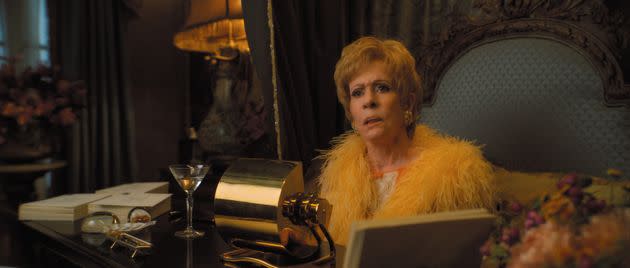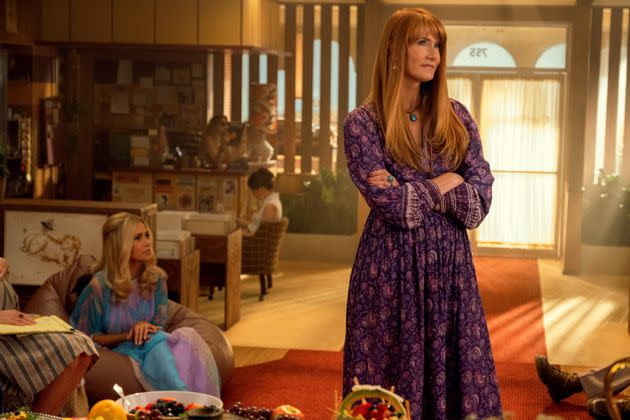'Palm Royale' Is A Big Disappointment
“It’s all a blur, a hazy, crazy blur,” Maxine Simmons (Kristen Wiig) says in the opening voiceover of “Palm Royale,” Apple TV+’s newest original series.
After watching the first three episodes of the miniseries that dropped Wednesday, I agree. The show, which takes place in Palm Beach, Florida, in 1969, is a blur of delightful period costumes and idyllic sets. But the outcome is hazy at best, proving that a prestige cast and a potentially prestige premise do not make a prestige TV show.
The show begins with Simmons climbing over a wall and falling into the grounds (and social web) of the most exclusive club in the world, the Palm Royale. It’s the beginning of the social season, and she seats herself at a table by the pool, orders her signature drink, a grasshopper, and eavesdrops on a pair of women just a table away.
They utter lines such as “no thing of beauty is safe” or “Palm Beach is the last American sanctuary” before taking sips of their cocktails and laughing off the notion of women’s progress.
In theory, this proposed premise — Simmons’ desire to be part of the society she envies — should be compelling, especially given that those women are played by an incredible cast, including Allison Janney and Leslie Bibb.
However, while the show’s tagline refers to “Palm Royale” as an underdog story about wanting to belong, the actual plot meanders, and the intended tone of the show is far less obvious.
After being kicked out of the club, Simmons sneaks into what appears to be a high-end nursing home to steal from the comatose (and “embolized”) queen of Palm Beach, Norma (Carol Burnett). From the short scene that ends with Norma’s foreboding lip twitch, it’s impossible to comprehend their connection, giving the show the air of a mystery tinged with likely family drama.

In the next scene, as Simmons exercises on the mini trampoline in her motel room while President Nixon talks about Vietnam on TV, it feels as if the show must be making a political point of some sort. This sentiment grows stronger in the following scene, when Simmons goes to get her nails done and runs into Linda Shaw (Laura Dern). Shaw invites her to a political gathering and asks her if she’s aware that “all women are fighting for their very right to exist.”
The heightened contrast between Simmons’ social-climbing femininity and Shaw’s pushy social commentary gives the show the feel of a social satire, as if it’s intentionally building upon the earlier poolside conversation to make a statement about feminism and social stratification.
At moments, this satirical aspect of the series has so much potential, especially in the second episode when Shaw is leading her circle of activists and says, “We’re made criminals just because we want the right to choose. If we have these hard conversations now, in 20 or 30 years, we won’t ever have to look back. Our daughters will never have to fight for their personal freedom.”
It’s impossible to listen to Dern deliver these lines of dialogue without hearing the implied irony and without knowing how wrong Dern’s character’s sentiment will become in a post-Dobbs world. Rare moments like this one elevate the show and emphasize how women are still fighting many of the same battles that they did in 1969. However, this subplot fades away so quickly that it undermines the scene and the themes that Shaw and her circle of hippies represent.
In the final minutes of the first episode, when Simmons’ husband finally appears, she talks about friendship and love with an unexpected sincerity that is quickly contrasted with the final voiceover. A male voice asks, “What happened, Maxine?” She says, “I have no memory of the incident in question, and that either makes everyone else liars, or I snapped.”

Suddenly, a gunshot fills the black screen, implying that the “incident” was violent and that t“Palm Royale” may actually be a satirical whodunit or who-will-do-it in the vein of “Knives Out.” But, during the second and third episodes, the momentum of the gunshot fizzles out, and the promise of a mystery to solve or a comedic satire to entertain goes unfulfilled. This becomes obvious in Episode 3, when the focus shifts to who has Norma’s ominous rolodex and who will host the most important social event, the end-of-season Beach Ball.
Even the idea that this is a straightforward underdog story feels false because the show vacillates between so many characters and their socially (and sometimes politically) charged subplots that it’s impossible to feel invested in Simmons’ story. In this way, “Palm Royale” reminds me of “The Gilded Age.” “Palm Royale” — to quote Simmons — is “aspirationally glamorous.” The costumes are elaborate and the sets are perfect, but everything else is disappointing.
Ultimately, the only thing I took from “Palm Royale” was fashion inspiration (which Apple must have assumed would be the case because they’ve partnered with Anthropologie for a “Palm Royale”-inspired clothing line).
Given the pitch-perfect costumes, the joyful spectacle of the sets and background actors (it rivals Amy Sherman-Palladino’s “The Marvelous Mrs. Maisel” in this way) and Wiig, Dern, Janney and Burnett at the helm, it’s tempting to hold out hope that the show will get better. Unfortunately, that hope is misguided.
“Palm Royale” was expected to be the spring’s prestige TV show, but it may just be this season’s biggest disappointment.

